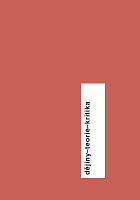Co si dnes počít s narativními kritikami dějepisectví? Historicko–vědní kritika narativních teorií dějepisu versus postnarativistický non-reprezentacionalismus
What Should We do with Narrative Critiques of Historiography? A Criticism of Narrativist Theories of Historiography Versus a Post-Narrativist Non-Representationalism from the Perspective of Historical Science
Author(s): Jan Horský Subject(s): Cultural history, Political history, Social history, Methodology and research technology
Published by: Univerzita Karlova v Praze - Fakulta humanitních studií
Keywords: Narrativism; non-representationalism; historiography;
Summary/Abstract: It seems apparent that a narrativist critique of historiography should be replaced by a criticism of narrativism from the perspective of historical science. What remains to be seen is whether the current non-representationalism can well serve to this task. The non-representationalist perspective shifts emphasis away from the question to what extent a historiographic text can represent the past and towards questions after the origin and nature of historiographic text. Can the advocates of non-representationalism admit that ‘the past’ can be in principle represented by a text? The relation between a representation (the relation between a text and ‘the past’) is not a subject of their interest: either because such a representation is not possible or because we cannot say about it anything with any certainly, eventually because that while it may be possible, it is of secondary importance for a historiographic text. Answering these questions is especially difficult since some of the key terms, especially ‘the past’ and ‘past reality’, remain unclear. The idea of historiography as a ‘science of the past’ or ‘writing about the past’ can, however, be contrasted with other approaches. According to some of these other notions, historical sciences investigate certain (selected) current entities. They are trying to understand them as traces by placing them in mutual configurations using a dynamic diachronic interpretation. It remains to be seen, however, whether the rationality of historiographic thesis can be determined without establishing its relation to some ‘materiality’. Differences in conclusions arrived at by a narrative critique of historiography and by the theory of historical science could be the result of the fact that historiography always includes at least two perspectives: the perspective of literary synthesis and a perspective of a scientific synthesis.
Journal: Dějiny - Teorie - Kritika
- Issue Year: 2017
- Issue No: 02
- Page Range: 335-353
- Page Count: 19
- Language: Czech

